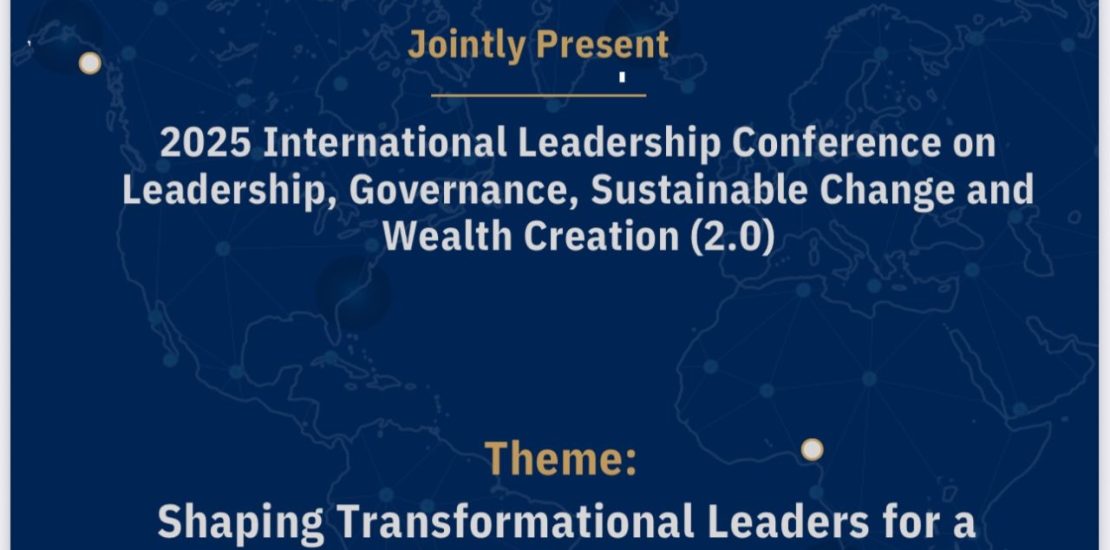- October 17, 2025
- Posted by: itmanager
- Category: Economics, International, Latest News, Tertiary Education, University

As Nigeria’s public debt continues to climb, concerns are mounting about the nation’s economic health and global reputation. Many have pointed fingers at weak leadership, but few voices carry as much weight and integrity as that of Aare Afe Emmanuel Babalola, OFR, CON, SAN, the Founder, Chancellor, and President of Afe Babalola University, Ado-Ekiti (ABUAD).
Speaking in Ado-Ekiti at the 2025 International Leadership Conference on Leadership, Governance, Sustainable Change and Wealth Creation (2.0), Aare Babalola expressed deep worry about what he described as a troubling pattern that threatens Nigeria’s financial stability and discourages foreign investors.
The conference, jointly organised by Afe Babalola University (ABUAD), Trinity Western University (TWU), Vancouver, Canada, and the African Centre for Leadership, Strategy and Development (CentreLSD), took place on Friday, October 17, 2025, at ABUAD’s Alfa Belgore Hall. It attracted top scholars, policymakers, and thought leaders from across Africa and beyond to discuss new approaches to governance, insecurity, and development.
Aare Babalola described the theme: “Shaping Transformational Leaders for a Changing World: Tackling Insecurity, Governance and Development” as “most appropriate at this stage of our national development.” He lamented that Nigeria’s debt profile has ballooned to an alarming ₦152.4 trillion (approximately $99.7 billion), a figure he said has made many foreign investors reluctant to commit capital to the country.
According to him, several banks have recently expressed frustration over the Central Bank of Nigeria’s inability to honour promissory notes issued by the government, a worrying signal of growing strain within the financial system.
Aare Babalola warned that without sound fiscal management and deliberate reform, Nigeria risks deeper economic instability and a loss of investor confidence. He reminded leaders of their constitutional duty to the people, quoting Section 14 of the 1999 Constitution, which states that “the security and welfare of the people shall be the primary purpose of government, as sovereignty belongs to the people,” he said, noting that the power of government must always be exercised in the best interest of the citizenries.

Delivering the keynote lecture titled “Transformational Leadership in an Insecure and Disruptive Era: Building Ethical, Resilient and Impactful Leaders for Africa,” Dr. Otive Igbuzor, Founding Executive Director of CentreLSD, identified leadership failure as the root cause of many of Nigeria’s economic and social crises.
Dr. Igbuzor called for a new generation of visionary leaders, men and women ready to challenge outdated systems, embrace innovation, and reward merit and creativity instead of mediocrity and patronage. He also urged the federal government to institutionalise leadership education at all levels, making leadership formation as essential as literacy and numeracy.
He emphasised that transformational leadership is key to tackling Africa’s biggest challenges, including corruption, unemployment, gender inequality, and environmental degradation.

In her remarks, Professor E. Smaranda Olarinde, FCArb, FCAI, the Vice-Chancellor of ABUAD, described the conference as both timely and transformative. She commended the collaboration between ABUAD, TWU, and CentreLSD, noting that such partnerships are vital in addressing Nigeria’s multidimensional challenges from insecurity and poverty to infrastructural decay and economic uncertainty.
Professor Olarinde reaffirmed that universities must go beyond their traditional roles as centres of learning to become incubators of ethical, visionary, and transformative leadership capable of driving sustainable development globally.
The 2025 International Leadership Conference featured thoughtfully curated sessions that engaged all participants and concluded with a resounding call for a new era of leadership grounded in integrity, driven by innovation, and guided by accountability, thereby restoring confidence, reviving the economy, and securing a prosperous future for all.

